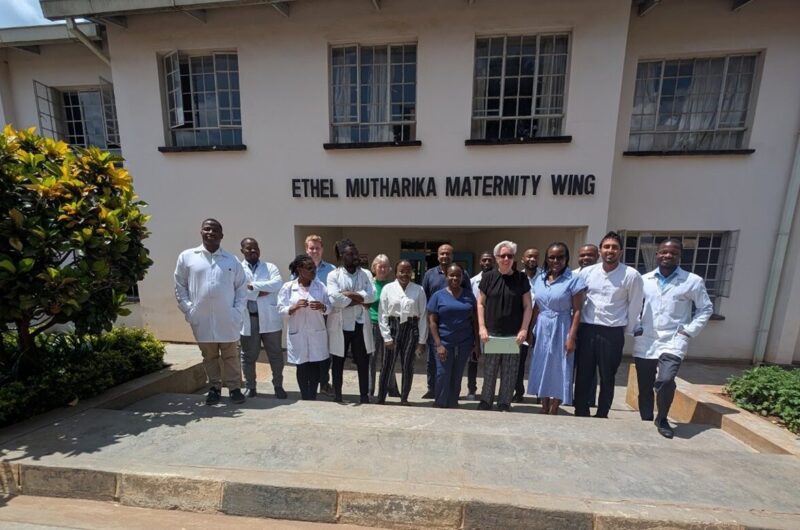By Mayur Gami
In this blog, East of England Global Health Fellow Mayur Gami reflects on a trip to Malawi to build support for patients, predominantly women, with incontinence. He discusses the development of a specialised service and the training of surgeons, highlighting both the practical challenges and progress being made in implementing this vital healthcare initiative in the country.
The week-long trip was part of a broader, long standing Urolink initiative to improve access to care for patients suffering from incontinence, enabling them to regain their dignity and fully participate in daily activities. The team comprised three UK consultants (including Mr Nikesh Thiruchelvam, Mayur’s supervisor and an Addenbrooke’s consultant who was part of the CGHP team) and two registrars.
Mayur’s visit encompassed lectures, teaching through live surgeries performed by the consultants, and ward rounds. As he reflects in the blog, the experience was enriching, inspirational and productive. It underscored the transformative potential of this service for women’s health and well-being in Malawi.
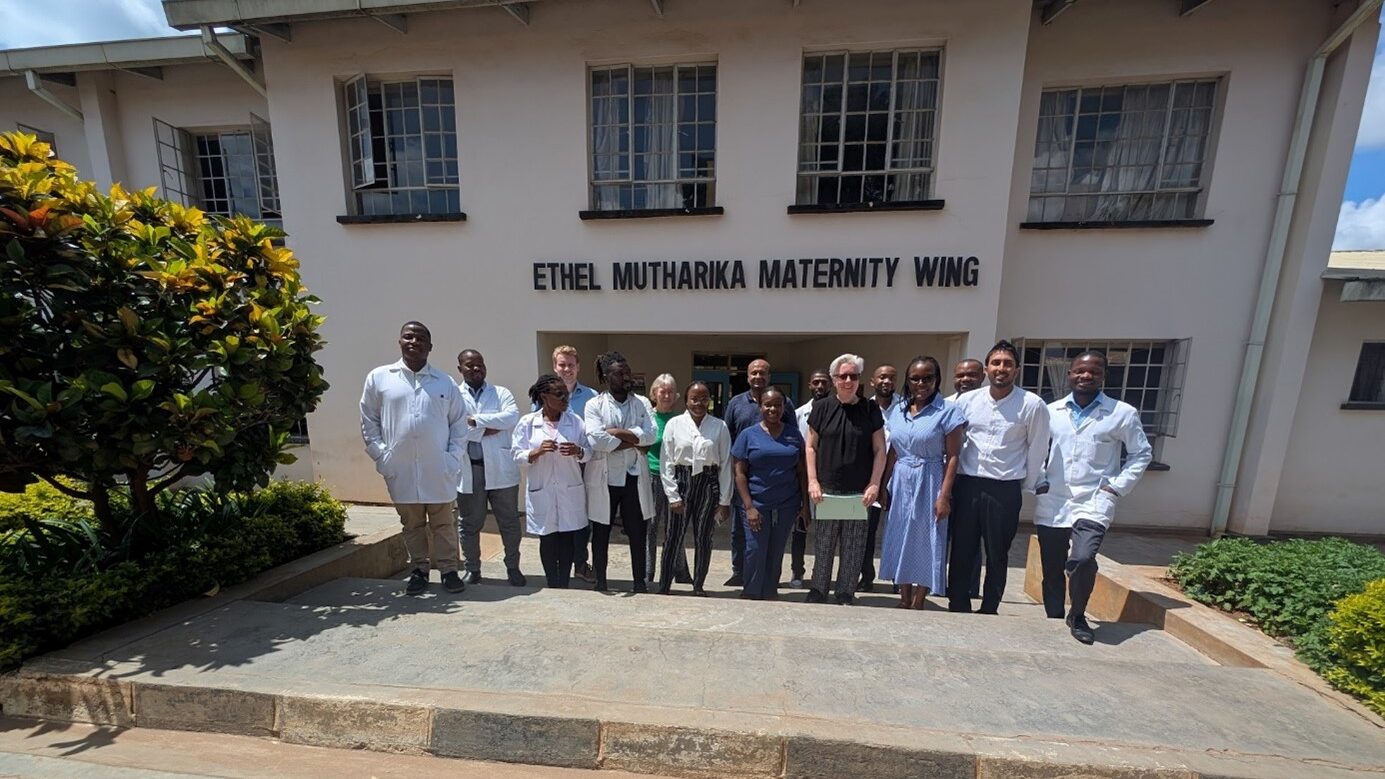
UK and Malawi registrars and consultants.
The Malawi context
Malawi, an Eastern African nation with 21 million people, is predominantly rural, with agriculture as its economic backbone. Lilongwe is the capital, and Chichewa is the primary language. The country faces severe healthcare challenges, including a shortage of surgical specialists [1].
Kamuzu Central Hospital (KCH) is a 1,200-bed hospital that was previously reliant on specialists from other countries. However, Malawi saw its first trained urologist qualify in 2016 and was accredited as a urology training centre in 2017. In 2023, Dr Linda Kayange became Malawi’s second consultant and first female urological surgeon. By 2025, there will be five consultants and nine registrars in training [2]. KCH has global urology partnerships with Urolink (BAUS, UK) and now CGHP (UK) via Urolink.
Since 2022, a UK medical team has collaborated with KCH, initially through a scoping visit and later an intensive training week. The 2025 visit continued this effort, focusing on live surgeries, lectures, and mentorship to strengthen predominantly female urinary incontinence care.
Medical environment and barriers to treatment
Urinary incontinence (UI) is a significant but underreported health issue in sub-Saharan Africa. Stigma, embarrassment, lack of trust in the healthcare system, and limited awareness of UI as a treatable condition all contribute to this.
The risk factors are the same as in high income countries and include having multiple children, increasing maternal age and obstetric complications [7, 8].
Urinary incontinence has profound social and psychological consequences. Women frequently report relationship problems, depression, and even suicidal thoughts. Stigma is a major barrier to seeking treatment, with cost, lack of treatment awareness, and misconceptions about curability cited as key reasons for not seeking medical care [9]. Cultural barriers further complicate care, with many Malawians seeking help from traditional healers before turning to medical professionals [13, 14]. This delays diagnosis and increases the complexity of surgical cases.
Urinary incontinence treatment is a low priority in overstretched healthcare systems [11]. and care is predominantly provided through NGO-funded surgical camps. Structured management for non-fistulous incontinence is in its infancy, with Malawi only recently building capacity through specialist training in tertiary centres.
‘Ambassador programmes’ which employ former fistula patients to raise awareness and guide new patients to treatment have been successful, but further rural outreach, education, and training programmes are needed to improve UI management [12].
Investment in healthcare training, public health campaigns, and innovative programmes is crucial. Improved obstetric care can help prevent cases, while reducing barriers to surgery—such as lost income for agricultural workers and transport costs—can improve access to treatment.
Malawi’s surgical infrastructure remains severely underdeveloped. Insufficient theatre space, surgical beds, and staff contribute to long hospital stays, as patients await urgent or emergency procedures, with non-urgent procedures such as UI surgery falling lower on the priority lists.
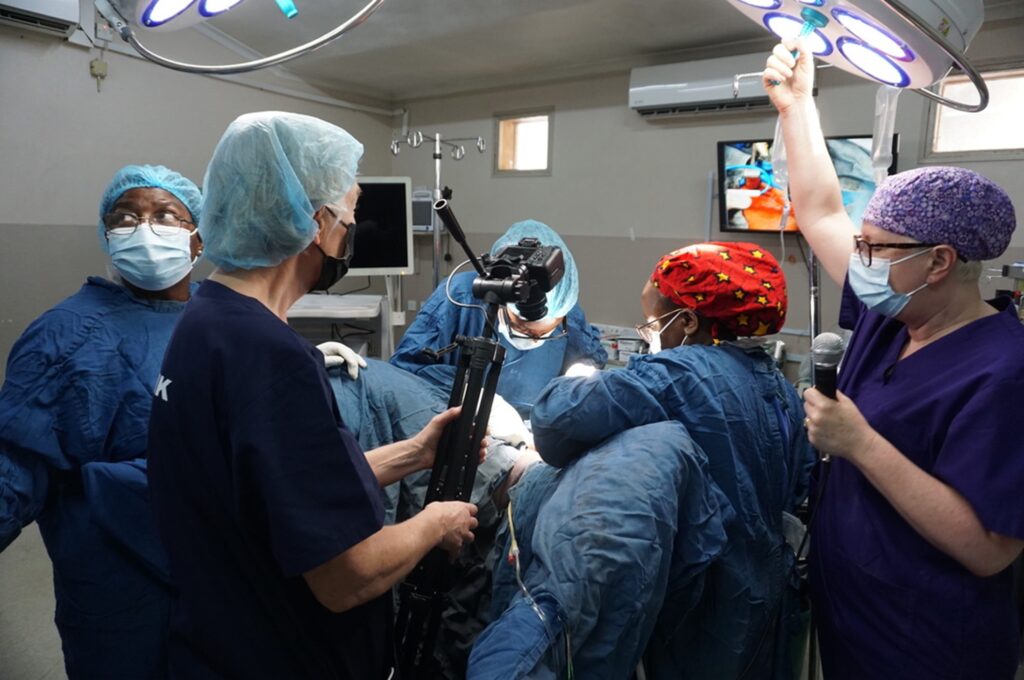
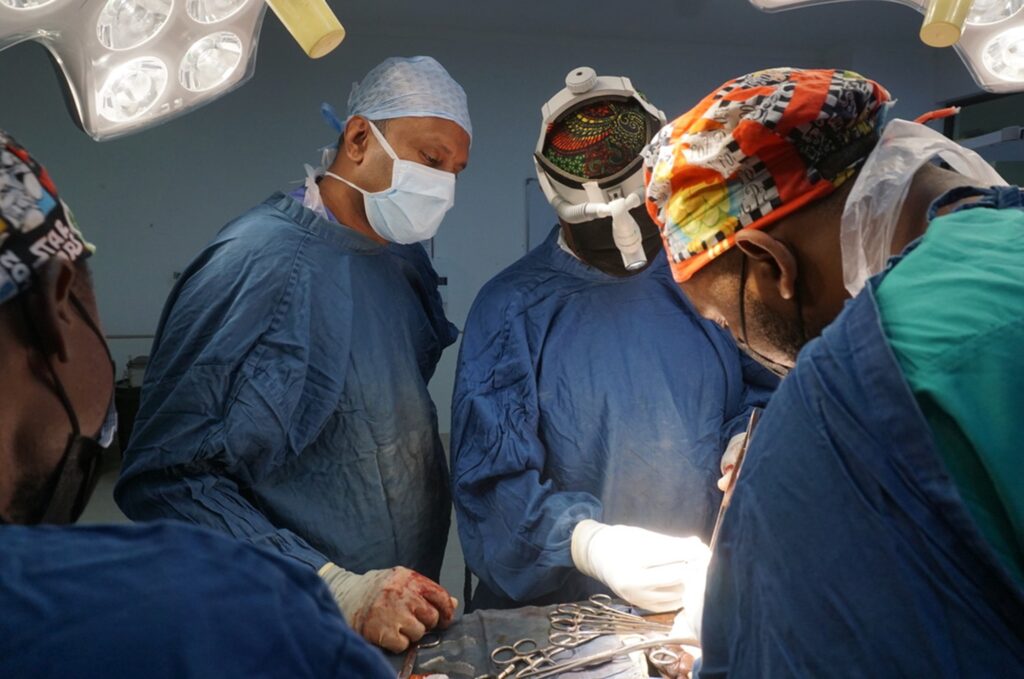
Recording the surgery for training purposes and (right) Mr Nikesh Thiruchelvam training local surgeons.
Aims of the visit
Over the week-long visit the team sought to:
- Continue to develop relationships and links with partners in Lilongwe.
- Develop the confidence of local surgeons to manage complex cases and provide exposure to registrars.
- Develop skills in identification and surgical management of urinary incontinence
- Teach and develop Urology and Gynaecology registrars.
Resillience and resourcefulness
While operating theatres were generally equipped with most necessities, frequent interruptions occurred due to the need for rapid sterilisation as the quantity of equipment was not available. Sterilisation was done primarily using a low-cost but disinfectant prone to causing side effects and with limited efficacy. However, in low-resource settings, such compromises are often unavoidable. One theatre lacked air conditioning, forcing operations in 30-degree heat, heightening discomfort and infection risks. Water and electricity cuts also disrupted procedures at critical moments. Despite these challenges, surgeons exhibited remarkable resilience, and all possible materials were recycled. Unlike in the UK, where surgical procedures generate excessive waste, Malawian operating theatres are forced to be financially and environmentally sustainable. Gowns and drapes are reusable and there is minimal single-use plastics/equipment. Research in surgical site infections in SSA suggest that there is a high incidence, but the direct impact of reusable gowns and drapes is unclear and the cause is likely to be multi-factorial [18] The World Health Organization has stated that reusable drapes and gowns pose no risk of significant harm [19]. The adaptability and ingenuity of Malawian surgeons in overcoming these constraints was inspirational.
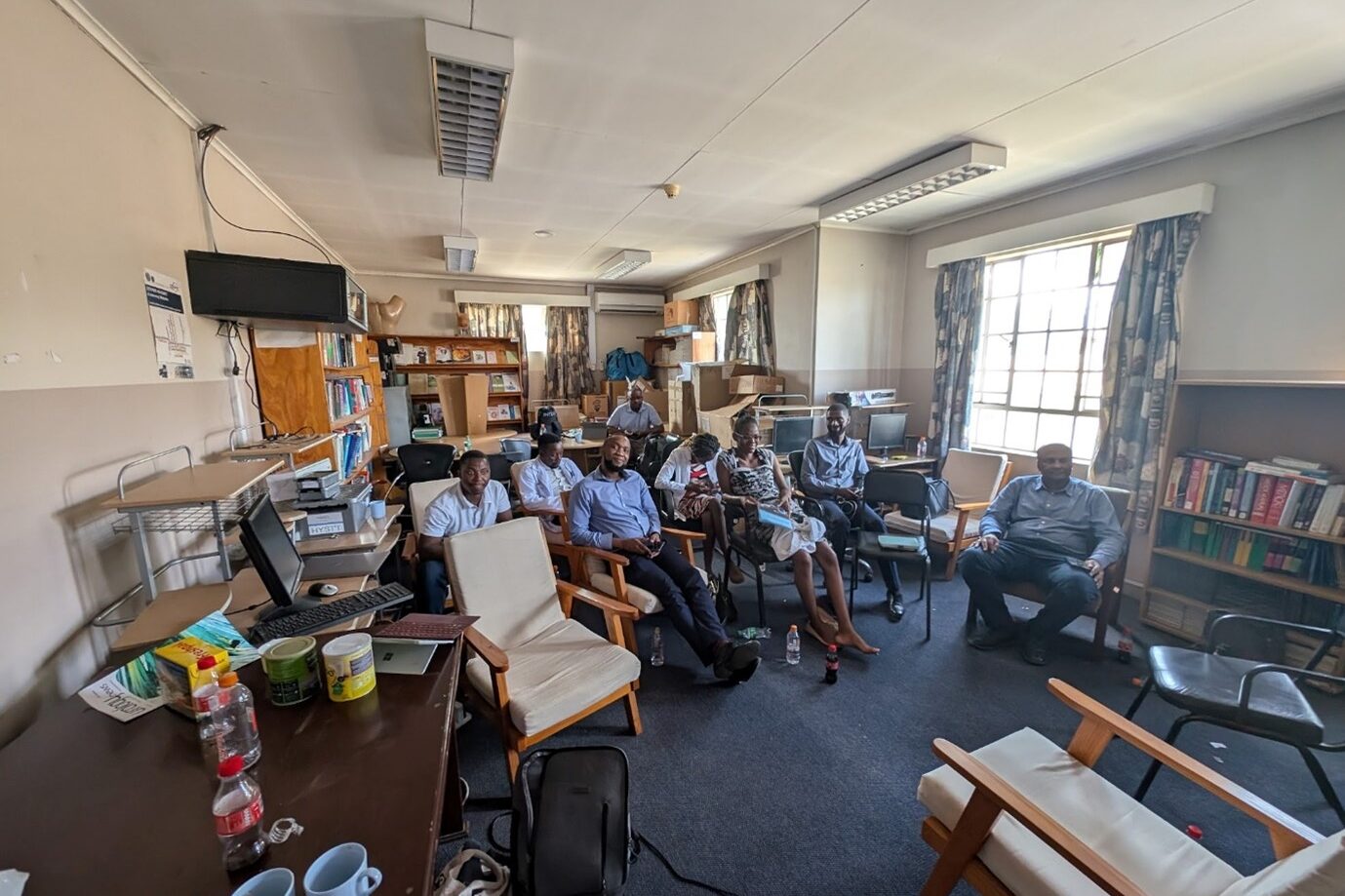
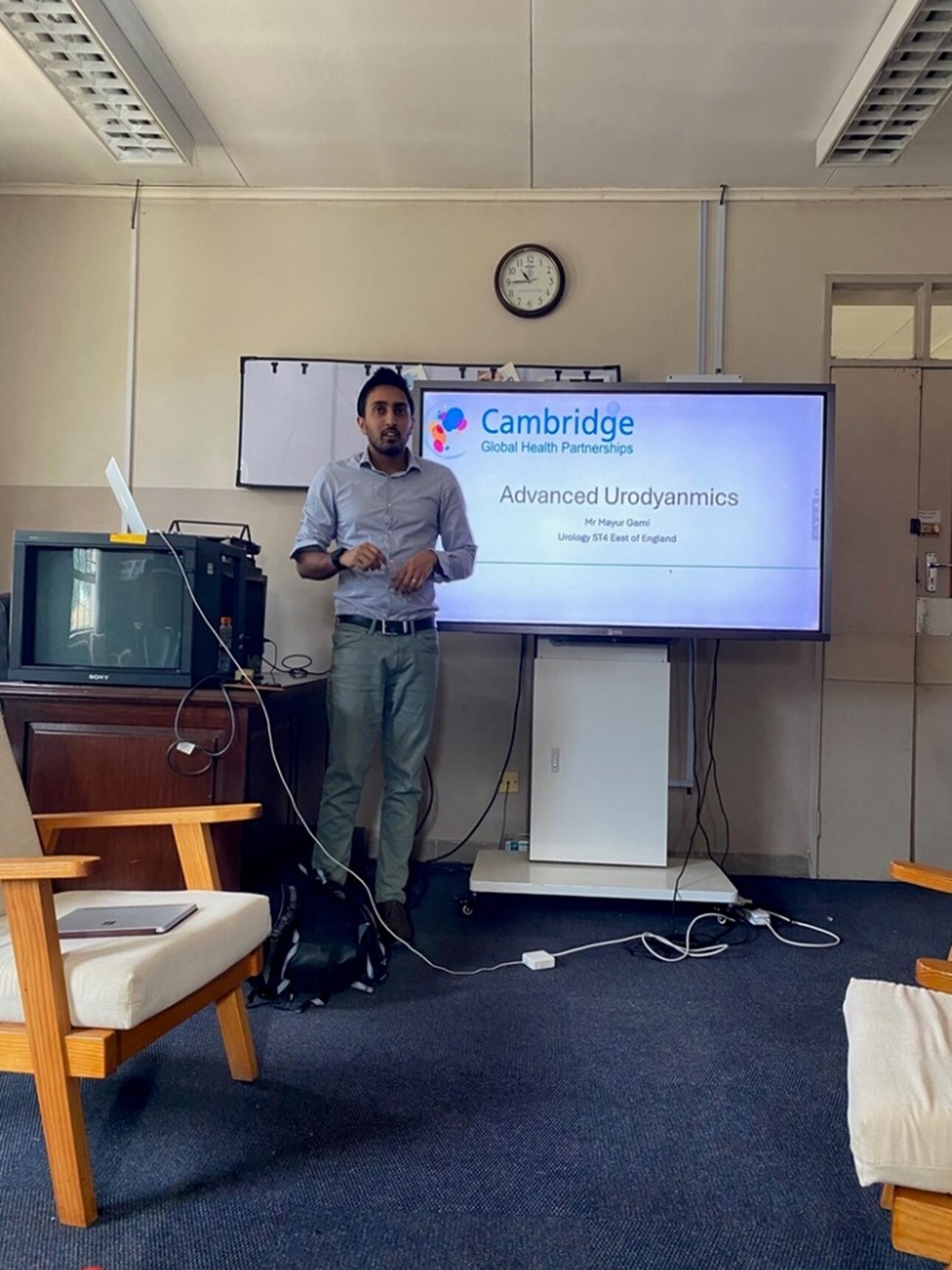
The Registrars’ teaching room and Mayur leading a session.
Reaching patients
In anticipation of the visit, a media bulletin was issued to raise awareness about the clinic, inviting women experiencing urological symptoms to seek care. Given the limited access to social media in rural areas, a consultant gynaecologists at KCH participated in a radio interview on a major station to encourage attendance.
Despite these efforts, turnout was lower than anticipated. The visit coincided with the peak agricultural season, when women are occupied in the fields and cannot afford to leave their work. This highlighted a crucial logistical challenge for future initiatives. Additionally, the interview was conducted exclusively in English, with no opportunity for translation into Chichewa, significantly restricting its reach. The impact was evident on the first clinic day, as all attendees were office workers fluent in English, underscoring the need for linguistically inclusive outreach strategies.
Many trainees face difficulties in managing stress urinary incontinence (SUI) cases due to limited exposure, leading to a dependence on a small number of registrars with prior experience in this area to conduct thorough assessments and establish diagnoses. This highlights significant gaps in training at tertiary referral centres, underscoring the need for supplementary educational initiatives aimed at upskilling healthcare teams in community settings and district hospitals as well.
Achievements and next steps
By the end of the week, the urology and gynaecology teams had developed proficiency in the comprehensive management of stress urinary incontinence (SUI). They had refined their skills in patient history-taking, clinical examination, and diagnosis, while the local surgeons were able to perform procedures independently and identify suitable candidates for intervention. With the increasing number of Urologists graduating in Malawi, the hope is that an incontinence service can begin to develop throughout the country.
To sustain these advancements, ongoing support is essential, and strong communication channels between the UK and Malawi will be pivotal in ensuring continued mentorship, service delivery, and outreach. While this visit focused primarily on stress urinary incontinence, there is significant scope to address urge incontinence. Plans are already underway for a follow-up visit next year to further consolidate expertise and broaden the scope of incontinence care.
With thanks to: BAUS Urolink, The Urology Foundation, the Urologist and Gynaecologists at KCH who facilitated the week.
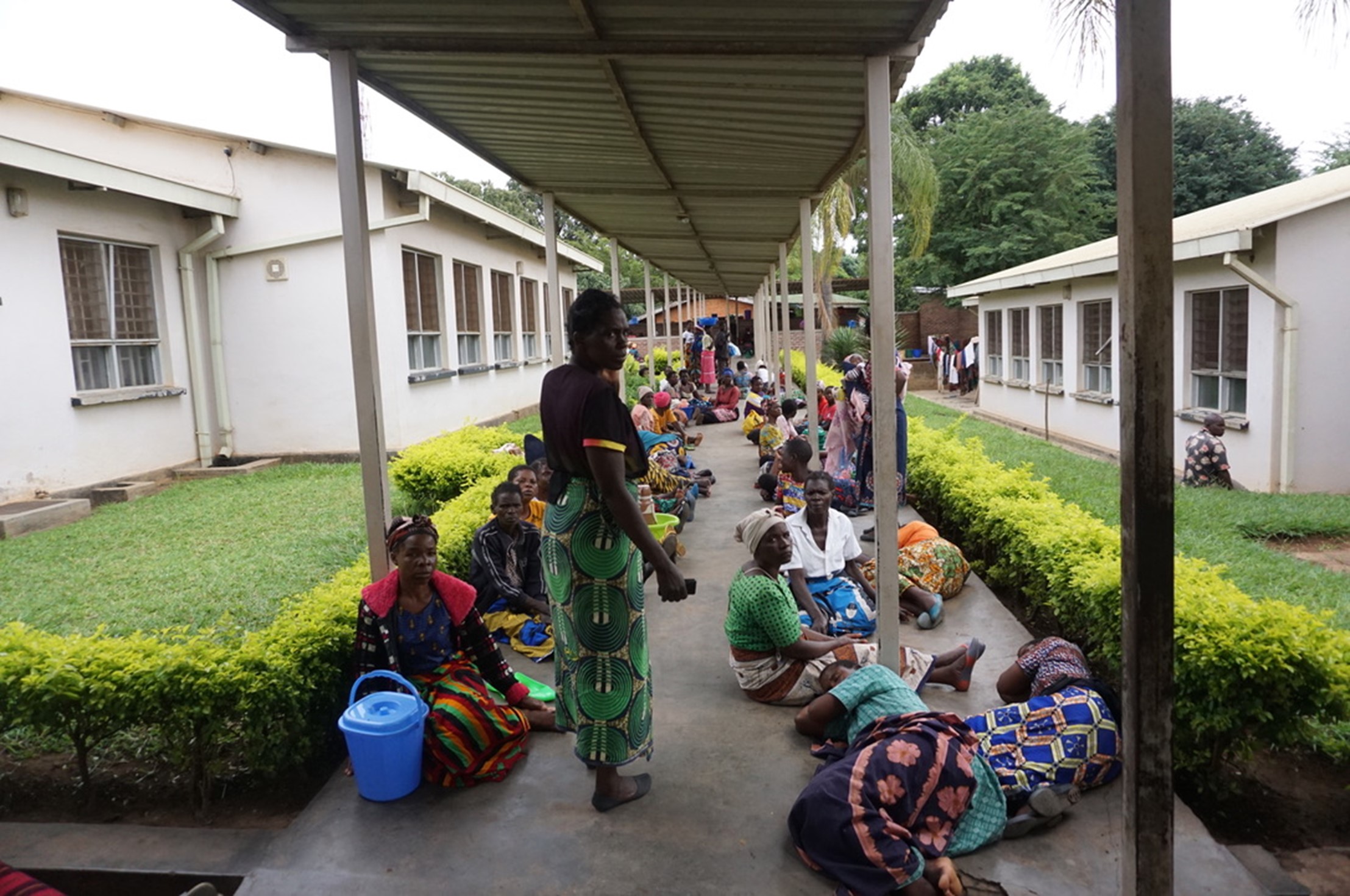
Lilongwe Hospital grounds.
Find out more about the East of England Global Health Fellowship scheme or contact us at info@cghp.org.uk
References:
[1] Lavy, C., Tindall, A., Steinlechner, C., Mkandawire, N. and Chimangeni, S., 2007. Surgery in Malawi–a national survey of activity in rural and urban hospitals. The Annals of The Royal College of Surgeons of England, 89(7), pp.722-724.
[2] Malawi | The British Association of Urological Surgeons (2025) https://www.baus.org.uk/professionals/urolink/malawi.aspx, (Accessed: February 28, 2025).
[7] Minassian VA, Drutz HP, Al-Badr A. Urinary incontinence as a worldwide problem. Int J Gynaecol Obstet 2003; 82: 327–38.
[8] Health Statistics Malawi (2018). https://www.unicef.org/malawi/media/566/file/Health%20Statistics%20Factsheet%202018.pdf (Accessed: February 28, 2025).
[9] Maheu-Giroux M, Filippi V, Samadoulougou S et al. Prevalence of symptoms of vaginal fistula in 19 sub-Saharan Africa countries: a meta-analysis of national household survey data. Lancet Glob Health 2015; 3: e271–8.
[11] Urolink scoping visit report (2023). https://www.baus.org.uk/_userfiles/pages/files/urolink/Urogyne%20Malawi%20visit.pdf (Accessed: February 28, 2025).
[12] Whiting, D., Shane, A.I., Pope, R., Payne, S. and Venn, S., 2022. Female urinary incontinence in sub‐Saharan Africa. BJU international, 130(5), pp.543-549.
[13] Scand J Urol [Internet]. 2024; Available from: https://www.tandfonline.com/doi/full/10.1080/08039410.2024.2374707 (Note: Author and full citation details should be extracted from the article itself.)
[14] Muriithi, F.G., Brandt, C., Muavha, D., Byamukama, O., Bagala, J.P. and Vij, M., 2025. Workload, Availability of Diagnostic Tools, and Treatment Options for Urinary Incontinence and Other Pelvic Floor Disorders in Women: An Online Survey on Practice and Challenges Faced by Providers of Urogynaecological Healthcare in Ten African Countries. International Urogynecology Journal, pp.1-9.
[18] Ngah, J.E., Bénet, T. and Djibrilla, Y., 2016. Incidence of surgical site infections in sub-Saharan Africa: systematic review and meta-analysis. The Pan African medical journal, 24, pp.171-171. [19] World Health Organization. Global Guidelines for the Prevention of Surgical Site Infection. 2nd edn. Geneva: WHO; 2018.
Return to blogs

